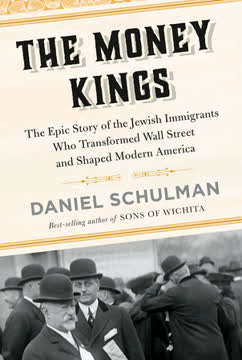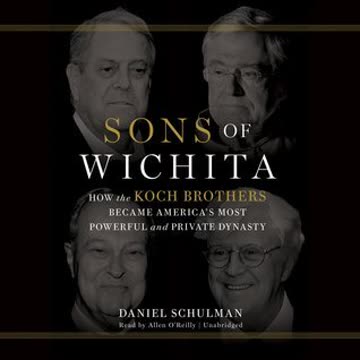Key Takeaways
1. From Peddlers to Pioneers: The Immigrant Drive Shaping Wall Street
Indeed, some of the world’s greatest financial institutions, companies that would dominate Wall Street and power America’s industrial transformation, were born out of rickety wooden carts and bulging canvas rucksacks.
Humble Beginnings. The narrative of "The Money Kings" begins not in opulent boardrooms, but on the dusty roads of America, where Jewish immigrants, often fleeing persecution and poverty in Europe, started as itinerant peddlers. This humble beginning was a common thread among families like the Seligmans, Lehmans, and Goldmans, who would later establish financial empires.
Peddling as Entrepreneurial Training. Peddling served as a rigorous training ground, instilling essential business skills such as salesmanship, resourcefulness, and risk management. These early experiences shaped their future success, providing them with a deep understanding of commerce and the American landscape. It was a Harvard Business School for Jewish boys.
Ambition and Opportunity. The United States, with its promise of religious freedom and economic opportunity, provided a fertile ground for these ambitious immigrants. Their drive to succeed, coupled with their unique skills and experiences, allowed them to overcome prejudice and build lasting institutions that transformed Wall Street and the American economy.
2. Family Ties and Business Acumen: The Foundation of Financial Dynasties
The proximity of these titans and their families in death hints at their intimacy in life.
Kinship and Trust. Strong family bonds were central to the success of these financial dynasties. Brothers, cousins, and in-laws formed partnerships based on trust and shared values, creating a stable foundation for their businesses. This close-knit structure allowed them to pool resources, share expertise, and navigate the complexities of the financial world with a unified front.
Complementary Skills. The most successful partnerships often involved individuals with complementary skills and temperaments. For example, Mayer Lehman's outgoing personality and risk appetite were balanced by Emanuel Lehman's cautious nature and financial acumen, creating a dynamic that fostered both growth and stability.
Intermarriage and Social Cohesion. Marriages within the German-Jewish community further strengthened these family ties, creating a close-knit social network that facilitated business deals and philanthropic endeavors. These unions reinforced their shared cultural and religious heritage, helping to preserve their identity in a new and often challenging environment.
3. Navigating Prejudice: The Delicate Balance of Assimilation and Identity
They were allies (and occasional rivals) in business, partners in philanthropy, friends, and in some cases in-laws.
Antisemitism as a Constant Presence. Despite their wealth and influence, these families faced persistent prejudice and discrimination. They were often excluded from elite social circles and subjected to stereotypes and slurs. This reality forced them to navigate a delicate balance between assimilation and maintaining their Jewish identity.
Philanthropy as a Response. Philanthropy became a crucial tool for these families to combat antisemitism and uplift their community. They established hospitals, orphanages, and educational institutions to support Jewish immigrants and demonstrate their commitment to American society. This philanthropy served both altruistic and strategic purposes, helping to improve the image of Jews and foster greater acceptance.
Internal Divisions. The desire to assimilate sometimes created divisions within the Jewish community, particularly between the established German Jews and the more recent Eastern European immigrants. These tensions reflected differing views on religious practice, cultural identity, and the best way to navigate the challenges of American life.
4. War as a Crucible: Fortunes Forged and Values Tested
The Ladies are respectfully invited to examine our beautiful styles of Bareges, Balzarines, Polk-a Muslins, Thread Laces, Hosiery, Bonnets and Ribbons, and a variety of Fancy Goods, which have been selected with taste, and will be sold at prices to suit the times.
Profiting from Conflict. The Civil War and subsequent conflicts presented both challenges and opportunities for these families. Some, like the Seligmans, profited from government contracts to supply the Union Army, while others, like the Lehmans, engaged in blockade running and traded with the Confederacy. These wartime activities tested their values and forced them to make difficult choices.
Moral Dilemmas. The issue of slavery and the Civil War created deep divisions within the German-Jewish community. While some, like the Seligmans, opposed slavery and supported the Union, others, like the Lehmans, adapted to the Southern culture and even owned slaves themselves. These moral compromises reflected the complex realities of assimilation and the pressures to conform to local norms.
The Civil War's Impact. The Civil War accelerated the nation's industrialization and financial development, creating new opportunities for these families to expand their businesses and solidify their positions on Wall Street. The war also highlighted the importance of government finance and the role of investment banks in supporting national interests.
5. The Rise of Jacob Schiff: Bridging Worlds and Defining an Era
He was a diminutive man—he claimed five feet six on his passport, though he might have been rounding up generously—but a colossus in finance and Jewish life, whom one New York paper described as “the foremost world-representative of his race.”
A New Kind of Leader. Jacob Schiff emerged as a dominant figure in both the financial world and the American Jewish community. Unlike his predecessors, Schiff possessed a unique combination of business acumen, political savvy, and a deep commitment to Jewish causes. He used his wealth and influence to advocate for Jewish rights, support Jewish immigrants, and shape the future of American Jewry.
Balancing Identities. Schiff navigated the complexities of his dual identity as an American and a Jew with remarkable skill. He was a staunch patriot who believed in the promise of American democracy, but he also felt a strong responsibility to his religious brethren around the world. This balancing act often required him to make difficult choices and navigate conflicting loyalties.
A Vision for the Future. Schiff envisioned a vibrant and thriving American Jewish community that was both integrated into American society and proud of its heritage. He supported initiatives that promoted education, social welfare, and cultural preservation, laying the foundation for the modern American Jewish community.
6. The Power of Alliances: Collaboration and Competition on Wall Street
He was one of the small but powerful group who have made the higher commercial life of New York City what it is today.
Cooperation and Competition. While these financial dynasties often competed for business, they also recognized the importance of collaboration. They formed alliances to undertake large-scale projects, share expertise, and navigate the complexities of the financial world. This combination of cooperation and competition fueled innovation and growth on Wall Street.
The Rise of Investment Banking. These families played a pivotal role in the evolution of modern finance, transforming Wall Street from a collection of small mercantile firms into a global financial center. They pioneered new financial instruments, developed innovative business models, and helped to create some of the nation's most iconic companies.
The "Money Kings." Their influence extended beyond the financial realm, shaping American politics, culture, and society. They advised presidents, influenced legislation, and supported the arts, leaving an indelible mark on the nation's development.
7. Philanthropy as a Moral Imperative: Beyond Wealth, a Legacy of Service
Schiff used his fortune unreservedly to ensure a future for the Jews, at a time when their long-term existence seemed very much in doubt.
A Sense of Responsibility. These families viewed philanthropy not merely as an act of charity, but as a moral imperative. They felt a deep sense of responsibility to use their wealth and influence to improve the lives of others, particularly those who were less fortunate.
Building Institutions. Their philanthropic efforts extended beyond individual acts of generosity to the creation of lasting institutions. They founded hospitals, orphanages, settlement houses, and educational institutions that continue to serve communities today. These institutions became cornerstones of American society, providing essential services and promoting social progress.
A Lasting Impact. Their commitment to philanthropy shaped the cultural landscape of the United States, fostering a tradition of giving back and supporting the arts, education, and social welfare. Their legacy continues to inspire generations of philanthropists and community leaders.
8. The Perils of Power: Scandals, Anti-Semitism, and the Limits of Influence
Wealth and power, and the myriad ways these German-Jewish dynasties left their mark on the modern world by expending both, are themes that run throughout this book—one that I initially hesitated to write.
Ethical Lapses. The pursuit of wealth and power sometimes led to ethical lapses and questionable business practices. The Panama Canal scandal, the Black Friday gold corner, and the overcapitalization of railroads tarnished the reputations of some of these families and exposed the dark side of Gilded Age capitalism.
Antisemitism as a Weapon. Their wealth and influence also made them targets of antisemitism. Conspiracy theories and hateful rhetoric often targeted Jewish bankers, accusing them of manipulating the financial system and controlling the world's resources. These attacks highlighted the vulnerability of even the most powerful Jews and the persistence of prejudice in American society.
Limits of Power. Despite their wealth and influence, these families could not always control events or protect themselves from criticism. The scandals and antisemitic attacks demonstrated the limits of their power and the challenges of navigating a society that often viewed them with suspicion.
9. The Shifting Sands of Loyalty: Navigating War and National Identity
I am an American, I am a German, and I am a Jew.
Divided Loyalties. World War I tested the loyalties of these families, many of whom had strong ties to both Germany and the United States. The conflict forced them to grapple with their dual identities and make difficult choices about where their allegiances lay.
Patriotism and Principle. While some, like Otto Kahn, became ardent supporters of the Allied cause, others, like Jacob Schiff, struggled to reconcile their love for their adopted country with their sympathy for their homeland. These internal conflicts reflected the broader divisions within American society and the challenges of maintaining neutrality in a world at war.
The End of an Era. The war marked the end of an era for these families, as the old social order crumbled and new forces reshaped the financial landscape. The conflict also exposed the fragility of their position and the enduring power of prejudice.
10. The Legacy of the Money Kings: A Foundation for Modern Finance and a Cautionary Tale
The title of this book comes from the term that newspapers often used to describe Jacob Schiff and his fellow financial heavyweights.
Shaping Modern Finance. The "Money Kings" played a crucial role in shaping modern finance, pioneering new investment strategies, building towering institutions, and fueling America's industrial transformation. Their legacy continues to influence the financial world today.
Philanthropic Footprints. Their philanthropy laid the foundation for American Jewish life, supporting education, social welfare, and cultural institutions that continue to thrive. Their contributions to the arts, sciences, and humanities enriched American society and left an indelible mark on the nation's cultural landscape.
A Complex Legacy. Their story serves as a cautionary tale about the perils of unchecked power, the persistence of prejudice, and the importance of ethical leadership. Their lives remind us that wealth and influence come with great responsibility and that even the most successful individuals are not immune to the forces of history.
Last updated:
FAQ
What is The Money Kings by Daniel Schulman about?
- Epic story of Jewish immigrants: The book chronicles how Jewish immigrant families transformed Wall Street and shaped modern America, focusing on their rise from humble beginnings to financial powerhouses.
- Intersection of finance and identity: It explores how these families balanced their Jewish heritage with their roles as financiers and American citizens, highlighting their influence on finance, philanthropy, and social reform.
- Historical context: The narrative situates these families within major events like the Civil War, World Wars, and the creation of the Federal Reserve, showing their impact on American and global history.
Why should I read The Money Kings by Daniel Schulman?
- Unique perspective on finance: The book offers a fresh look at the origins of modern American finance through the lens of Jewish immigrant families, going beyond traditional Wall Street histories.
- Rich historical and cultural detail: Schulman’s research uncovers lesser-known episodes, such as the Galveston Movement and the families’ responses to antisemitism, providing a nuanced understanding of their challenges and achievements.
- Inspiration and legacy: Readers gain insight into resilience, innovation, and philanthropy, learning how these families used their influence to support social causes and shape American society.
Who are the main families featured in The Money Kings by Daniel Schulman, and what roles did they play?
- The Schiffs: Led by Jacob Schiff, they were central to Kuhn Loeb & Co., influencing banking reform, philanthropy, and Jewish communal leadership.
- The Warburgs: A German-Jewish dynasty, they bridged European and American finance, with Paul Warburg instrumental in creating the Federal Reserve.
- The Lehmans, Seligmans, and Goldmans: Founders of major Wall Street firms, they financed railroads, industry, and infrastructure, and contributed to Jewish and civic causes.
- Interconnected dynasties: Through marriages and partnerships, these families created powerful transatlantic networks that shaped global finance.
How did Jewish immigrant families overcome adversity in America according to The Money Kings by Daniel Schulman?
- Starting from the bottom: Many began as peddlers or small merchants, facing poverty and social exclusion, which honed their business skills and resilience.
- Building businesses and networks: They leveraged family and community ties to transition into banking and finance, supporting each other’s ventures.
- Facing and combating antisemitism: Despite discrimination in business and society, they responded by building their own institutions and engaging in philanthropy.
- Community support: They established social welfare programs, schools, and charities to assist new immigrants and foster integration.
What was the impact of antisemitism on the Jewish banking families in The Money Kings by Daniel Schulman?
- Social and business barriers: Families like the Seligmans faced exclusion from hotels, clubs, and elite circles, despite their financial success.
- Public prejudice and propaganda: Antisemitic stereotypes and conspiracy theories, including those promoted by Henry Ford and the Nazis, targeted these families.
- Institutional responses: They created their own social clubs, charities, and communal organizations to counter exclusion and support their communities.
- Resilience and advocacy: Leaders like Jacob Schiff used philanthropy and political engagement to fight discrimination and aid Jewish refugees.
How did the Jewish banking families influence Wall Street and American finance, as described in The Money Kings by Daniel Schulman?
- Railroad financing and reorganizations: Families like the Seligmans and Kuhn Loeb played pivotal roles in funding and restructuring major railroads, shaping the nation’s infrastructure.
- Investment banking innovations: Firms such as Goldman Sachs and Lehman Brothers pioneered new financial instruments and underwriting for emerging industries.
- International alliances: Through marriages and business partnerships, they established transatlantic networks that facilitated global finance and diplomacy.
- Philanthropy and social leadership: Their wealth funded both Jewish and broader social causes, intertwining finance with civic responsibility.
What role did Jacob Schiff play in American finance and Jewish philanthropy according to The Money Kings by Daniel Schulman?
- Investment banking leadership: Schiff transformed Kuhn Loeb & Co. into a powerhouse, leading major railroad financings and corporate reorganizations.
- Philanthropic pioneer: He supported Jewish and secular causes, including orphanages, hospitals, and educational institutions, often preferring anonymity.
- Political and social activism: Schiff used his influence to aid Jewish immigrants, oppose antisemitism, and support Zionism, notably financing Japan during the Russo-Japanese War.
- Legacy of integrity: He was known for his ethical leadership, combining financial acumen with a strong sense of justice and responsibility.
What was the significance of the Galveston Movement in The Money Kings by Daniel Schulman?
- Immigration deflection strategy: Led by Jacob Schiff, the movement aimed to redirect Jewish immigrants from crowded East Coast cities to the American interior via Galveston, Texas.
- Easing urban congestion: The initiative provided better opportunities for immigrants and helped shape Jewish American demographics in the Midwest and South.
- Challenges faced: The movement encountered resistance from nativists and logistical difficulties, but persisted through determined advocacy and support services.
- Legacy: Though it ended by 1914, the Galveston Movement exemplified the intersection of finance, philanthropy, and social engineering.
How did the Jewish banking families contribute to the creation of the Federal Reserve System, according to The Money Kings by Daniel Schulman?
- Paul Warburg’s advocacy: Warburg, drawing on European central banking models, was a key architect of the Federal Reserve System.
- Collaboration with policymakers: He worked closely with President Wilson and Treasury officials to design and pass the Federal Reserve Act in 1913.
- Response to financial crises: The Panic of 1907 exposed flaws in the U.S. banking system, motivating reforms championed by Warburg and others.
- Controversy and legacy: Their involvement sparked antisemitic conspiracy theories, but ultimately modernized American finance.
What was the impact of the Russo-Japanese War on the Jewish banking families in The Money Kings by Daniel Schulman?
- Financing Japan’s war effort: Jacob Schiff and Kuhn Loeb & Co. provided critical loans to Japan, motivated by opposition to Russian antisemitism.
- Shifting global power: This financial support helped Japan defeat Russia, altering the balance of power in East Asia.
- Diplomatic and social consequences: Schiff’s actions enhanced his international stature but also intensified antisemitic backlash.
- Enduring legacy: The episode demonstrated the global reach and influence of Jewish financiers.
How did the Jewish banking families respond to World War I and its aftermath in The Money Kings by Daniel Schulman?
- Support for the Allies: The families provided financial and philanthropic support to the Allied war effort and relief for war victims.
- Navigating divided loyalties: With German roots and American citizenship, they faced complex personal and diplomatic challenges.
- Postwar diplomacy: They participated in peace negotiations and efforts to stabilize Europe’s economy, advocating for Jewish refugees.
- Philanthropic mobilization: Organizations like the Joint Distribution Committee coordinated massive relief efforts for Jewish communities.
What are the best quotes from The Money Kings by Daniel Schulman and what do they mean?
- On leadership and ethics: Jacob Schiff said, “One needs to have God in his heart...such a person is naturally a leader,” emphasizing moral authority as the foundation of leadership.
- On philanthropy: Schiff stated, “The surplus wealth we have gained...belongs to our fellow-beings; we are only the temporary custodians,” reflecting the Jewish concept of tzedekah and social responsibility.
- On antisemitism: Henry Ward Beecher observed, “There is not another race...that is in such a sense a benefactor...and there is not another people...treated so like despicable miscreants,” highlighting the paradox of Jewish contributions and persecution.
- On legacy: Rabbi Stephen Wise said of Schiff, “No man can take his place...Schiff is gone, and with him passes the Schiff era,” underscoring his unique and irreplaceable impact on Jewish philanthropy and finance.
Review Summary
The Money Kings receives generally positive reviews for its well-researched exploration of Jewish immigrants who shaped Wall Street and modern America. Readers appreciate the historical insights and fascinating stories, though some find the extensive detail and numerous characters challenging to follow. The book is praised for its examination of antisemitism, philanthropy, and the complex dynamics of finance and politics. While some reviewers note slow pacing in parts, most recommend it for those interested in financial history and Jewish-American experiences.
Similar Books
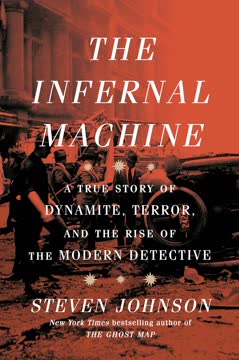

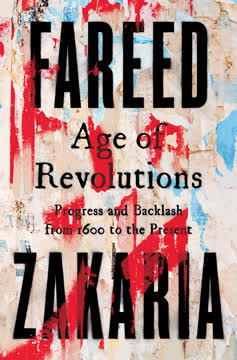


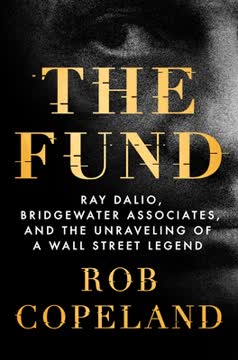
Download PDF
Download EPUB
.epub digital book format is ideal for reading ebooks on phones, tablets, and e-readers.
